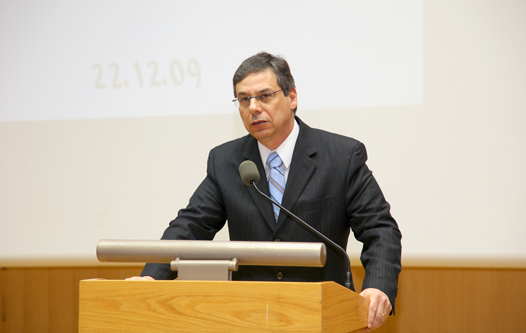REENERGIZING ZIONISM

DANNY AYALON
DEPUTY MINISTER OF FOREIGN AFFAIRS
OF THE STATE OF ISRAEL
19 July 2011
(This article was first published at Deputy Minister of Foreign Affairs, Danny Ayalon’s Personal Webpage, and republished under his permission)
The moment God said to Abraham Lech-Lecha, Zionism was born. Almost 4,000 years later, the Jewish People as a nation have never known any other home. Through 2,000 years of exile, our people faced the land of Zion during every prayer, remembered its destruction at every wedding and hoped for its rebuilding at the end of every Pesach Seder and Yom Kippur’s Neilah Service.
Over the years many have sought to attach appellations to the term Zionist, whether as a Religious Zionist, Labor Zionist, practical Zionist, or other such terms. However, what unites us is Zion, what divides us is minimal and superficial. Unfortunately, there have been recent attempts to abuse this term that is sacred to all of us.
In 2000, author Yoram Hazony wrote the book The Jewish State: The Struggle for Israel’s Soul, in which he vividly described the trend of post-Zionism, led by the so-called “New Historians”, which sought to define the Zionist project as immoral or illegitimate. Hazony, and others at the turn of the millennium, attempted to arouse an understanding of the direct affront and challenge to the Zionist ideals which we share.
The recent debate surrounding the amendment to the Pledge or Oath of Allegiance for potential new immigrants, adding the simple and standard words “Jewish and democratic”, has shocked many Zionists to their core about how polarized and popular the post-Zionist discourse has become. The venom and opprobrium directed at the amendment, parroting a classical Zionist position, proves that this discourse has permeated the mainstream, by design or by default.
Firstly, it is vital that we get our facts in order. The term “Jewish State” was not created in the year 2010. Since the inception of modern Zionism, which stood on the shoulders of thousands of years of historical and biblical Zionism, the “Jewish state” has been the rallying call for the return to political sovereignty in our ancestral land. The term is recognition of a sovereignty stolen from the Jewish people 2,000 years ago, but remaining in our hearts wherever we sojourned.
The father of modern political Zionism, Theodor Herzl, was the first to coin the modern political phrase when he wrote Der Judenstaat, “The Jewish State,” during 1896. Almost a decade earlier, Naphtali Herz Imber wrote the words to our national anthem, unashamedly reflecting the Jewish yearning for a national return to Zion.
In 1917, the Balfour Declaration was secured from Great Britain and endorsed by the League of Nations through the British mandate for Palestine. The mandate explicitly provided for Jewish national rights while safeguarding the civil and personal rights of non-Jews in Mandatory Palestine In fact, the mandate was given to Britain for the specific purpose of facilitating Jewish immigration, settlement, and the establishment of a “national home for the Jewish people”.
On November 29, 1947, the international community overwhelmingly recognized the need for the establishment of a Jewish state, when the United Nations Security Council passed resolution 181. Although the resolution was not binding and does not serve as the legal basis for the State of Israel, it demonstrates unequivocally that the idea of a Jewish State had the support of the majority of the international community.
Less than one year later, the Jewish state was realized as David Ben-Gurion read the immortal words of the Declaration of Independence, which contained the term “Jewish state” no less than five times. In fact, the name for the new nation was at one time to be called simply ‘The Jewish State’. As a result, US President Harry Truman prepared a text recognizing the new state with the words “Jewish State”, which were struck through in pen when he was informed that the new state would instead be called Israel.
Thus we see that the concept of the Jewish State was far older than the name of our state. As Professor Amnon Rubinstein recently and correctly observed, “It is not Israel that was to become a Jewish state, but a Jewish state that was to be called Israel.”
This is also expressed in our Basic Laws which hold a quasi-constitutional basis.
The Basic Law: Human Liberty and Dignity, passed by the Knesset in 1992, states as its purpose “to protect human dignity and liberty in order to establish in a basic law the values of the State of Israel as a Jewish and democratic state.”
Thus, the term “Jewish State” has a firm constitutional status from the Declaration of Independence and is enshrined in our Basic Laws whose legal standing is superior to all other laws.
Today, regrettably, large sections of the Israeli public and Jewish Diaspora feel uncomfortable with the notion of a Jewish State or Zionism. Perhaps this is because they confuse the term with a solely religious or ideological connotation. There are also those who point to the current unrelenting delegitimization campaign against the State of Israel, and say that touting this term is merely adding fuel to the flames.
If we allow our enemies to dictate the definition of our national character then we are on a very slippery and dangerous slope towards national extinction. We should remain proud of our national character, as others are of theirs.
Many American politicians tout the idea of “American exceptionalism”, while in Japan Nihonjinron, refers to the unique aspects of Japanese national and cultural identity. Yet in Israel and the Jewish World, we are frequently embarrassed of our uniqueness and wish to strip it of any defining features, to make our nation a “Hebrew-speaking republic” which leaves us little to be proud of.
Those of us who are proud to affirm their continued and enduring support for Zionist ideals have to pick up the gauntlet that has been thrown down. This is not an issue of Right or Left, it is an issue of those who proudly state that our full adherence to the principles enunciated by the Zionist fathers and mothers are still as relevant today as they were then, against those who feel that Zionism has concluded its role and our uniqueness is more a source of embarrassment than shame.
We need a movement to reclaim our base foundations, values and national character. This must begin with education.
We must educate our children as to the meaning of being Jewish. To be Jewish is to be part of a great nation, civilization, culture and people. We are a people who had a language, borders, sovereignty and the rule of law before the vast majority of most states came into existence. I frequently tell visiting dignitaries who are similarly uncertain that Jews are to Israel as the Chinese are to China and the Greeks are to Greece.
Many on the international stage understand our position well. The U.S. administration’s national security strategy released last year reaffirms Israel’s national character. The strategy cites the goal of “a Jewish state of Israel, with true security, acceptance and rights for all Israelis.”
It is precisely now, because of this unparalleled assault on our legitimacy both from without and within that we need the Jewish community and our friends not afraid to state objections to those who seek the relinquishment or dilution of our national purpose, ethos and uniqueness.
It is worrying that a new generation of Jews has become too comfortable and too complacent and accepts many of the distorted barbs aimed at our country. Before we challenge the ill-informed outside of our community, we must first reach out to our own.
We need to reengage with the young generation using the three R’s. Firstly, we need to reach-out. We need to engage with high school students before they reach universities and become overwhelmed or engulfed in the anti-Israel maelstrom that permeates certain campuses in the Diaspora.
We need to report, by teaching and educating our youth about the history of Israel. While the notions of freedom and democracy are for the first time gaining credence in parts of the Arab world, how many are aware of Israel’s historic challenges.
The Jewish State created one of the most robust and dynamic democracies anywhere in the world out of a nation of people that arrived from 130 countries, most escaping repression and autocracy.
Our challenge is to remove the fog of ignorance that surrounds our history and the conflict.
Finally, we must teach our youth how to respond. For every canard there is a response, for every assertion there is a fuller picture and for every lie there is a truth. The new generation of Jews, in Israel and the Diaspora, only knows the Israel of today and not the heavy challenges that were met to sustain this very presence. To maintain a relationship with Israel we need a longer-term program which presents the Israel of today in its proper context.
While many are creating new programs or strategies to reboot our hasbara, or public diplomacy, there remains absolutely no substitute for knowledge. It is our task to ensure that the Jewish future is equipped with all of the tools to meet the challenge of identifying openly and unashamedly with Zionism and the Jewish State.
You might also want to read[srp srp_number_post_option=’5′ srp_widget_title=’ ‘ srp_thumbnail_wdg_height=’60’ srp_thumbnail_wdg_width=’60’ srp_include_option=’626′ srp_thumbnail_option=’yes’ srp_content_post_option=’titleonly’] You might also want to watch
|

